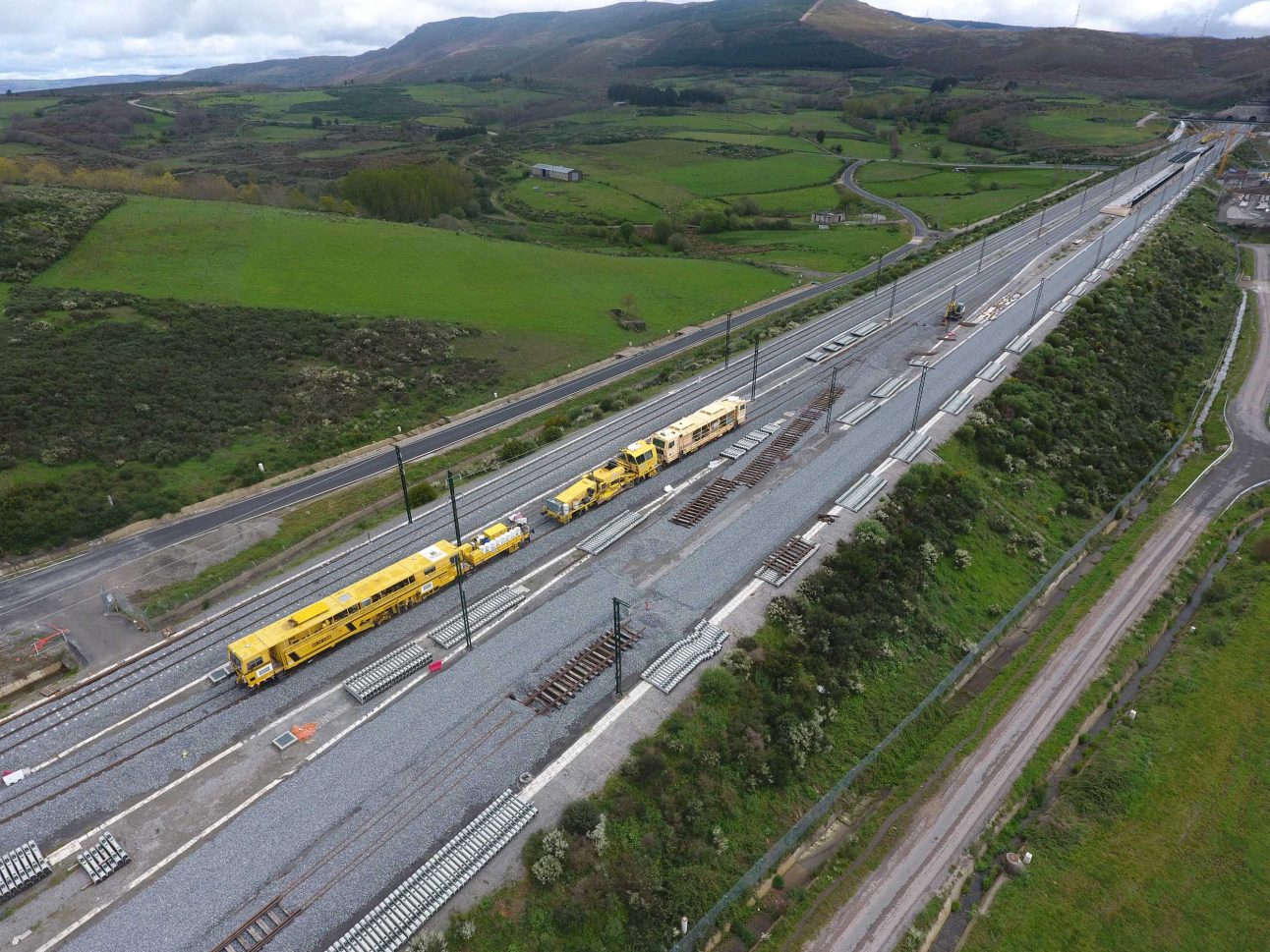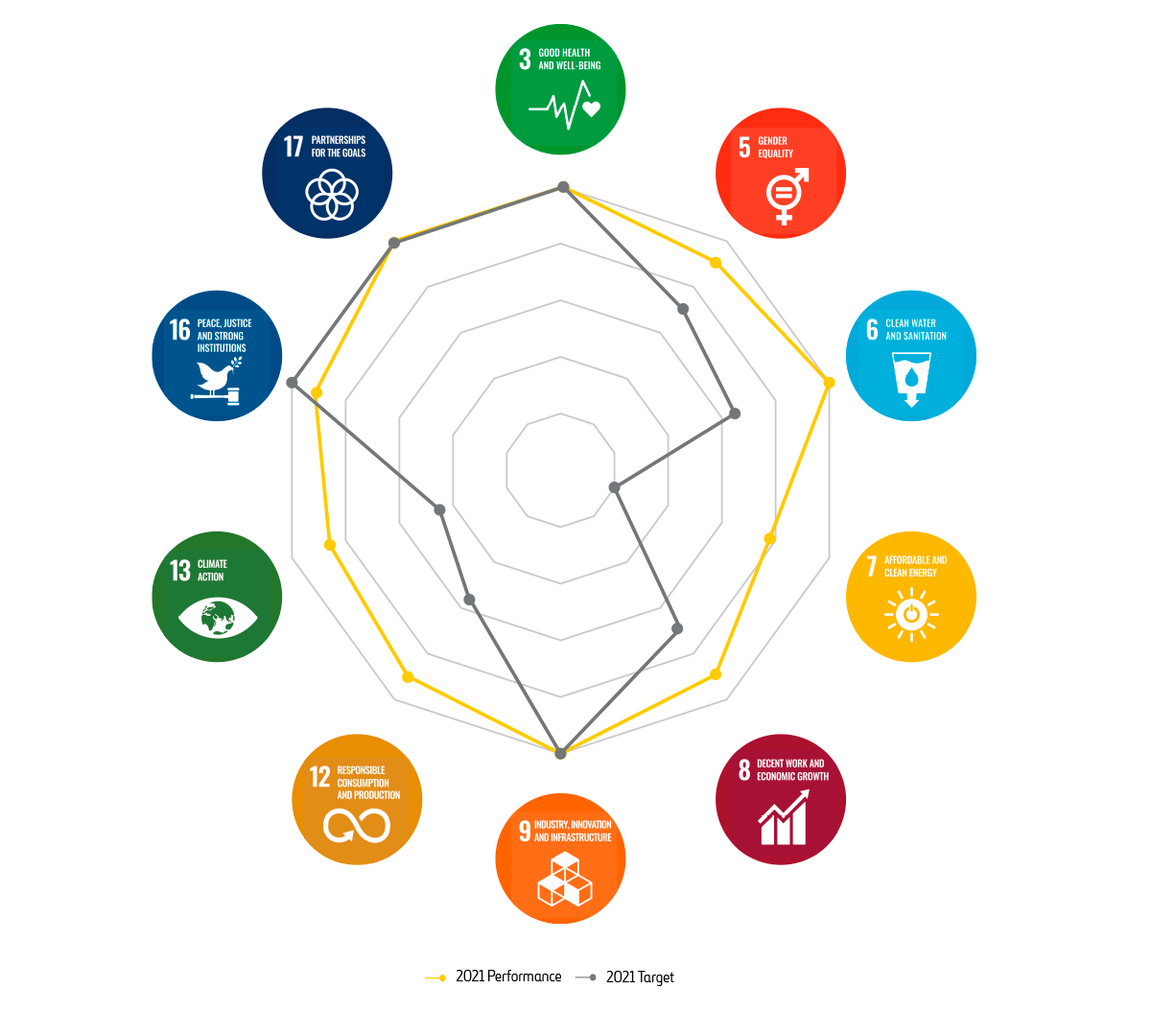-
1. Management Report 2021
- 1.1 In two minutes
- 1.2 Strategy and value creation
- 1.3 Ferrovial in 2021
- 1.4 Risks
- 1.5 Corporate Governance
- 1.6 Expected Business Performance in 2022
-
Appendix
- Alternative Performance Measures
- Sustainability Management
- Reporting Principles
- European Taxonomy
- Task Force on Climate Related Disclosures
- Scoreboard
- Contents of Non-Financial Information Statements
- SASB Indicators
- GRI Standard Indicators
- Appendix to GRI Standards Indicators
- Glosary of Terms
- Verification Report
-
2. Consolidated Financial Statements 2021
- Consolidated Financial Statements
- Audit Report
Sustainability Management
Ferrovial understands sustainability and corporate responsibility (CR) as a voluntary but essential commitment to participate in the economic, social and environmental development of the communities where it operates. The CR Policy is based on the principles of the Global Compact and internationally accepted agreements and resolutions related to the subject. Ferrovial’s Board of Directors is responsible for ensuring compliance with these principles, which the company has voluntarily assumed. The policy is available at www.ferrovial.com.
The content of this document constitutes a Sustainability Policy report in itself. It provides stakeholders with detailed information on the policy’s support instruments to enforce compliance; the Sustainability Strategy, formulated in the Strategic Sustainability Plan; and specific sustainability and CR practices, which are mentioned in the corresponding sections.
COMMITTEE
The Sustainability Committee is chaired by the Sustainability Director and is composed of representatives from the business areas (Toll Roads, Airports, Construction, Energy Infrastructures and Mobility) and the corporate areas (Human Resources, General Secretariat, Occupational Health and Safety, Risks, Innovation, Corporate Social Responsibility, Strategy and Investor Relations). On an annual basis, the Chairman of the Committee reports to the Board of Directors.
The Sustainability Committee is the link between the business areas and the corporation and Senior Management, reporting on the progress and results, and proposing actions to the Management Committee, as well as transmitting the approval of proposals and results to the rest of the company.
The main objective of this committee is to define the Strategic Sustainability Plan and ensure its monitoring. Its functions can be summarized as follows:
- Design, update and, if necessary, improve the Sustainability Strategy.
- Supervise and evaluate the company’s performance in the area of sustainability based on established indicators and action plans.
- Propose working groups on specific issues.
- Share best practices from each of the areas on sustainability issues.
- Provide information for sustainability reporting (both internal and external).
- Analyze and assess sustainability trends, new business risks and opportunities.
STRATEGIC PLAN
The Strategic Plan is the indispensable tool to ensure that CR and sustainability are effective in fulfilling its mission and contributes to business development, the generation of trust among its stakeholders and the fulfillment of the objectives in the medium and long term.
The Sustainability Committee has promoted the new Plan, Sustainability Strategy 2030, drawn up taking into account the main global macro-trends, the regulatory and normative environment (United Nations Agenda 2030, Climate Change and the European Green Deal), the main economic and financial frameworks (Task Force on Climate-Related Disclosures. TCFD), Taxonomy and the European Next Generation Plan), social challenges (new urban agenda, new mobility habits, post-COVID-19 effects such as teleworking and the rise of e-commerce), technological factors (energy transition and digitalization), environmental factors (climate change, water scarcity, biodiversity loss and public health), ESG investor requirements, major reporting frameworks (Global Reporting Initiative, Sustainability Accounting Standards Board (SASB) and the TCFD, as well as CR trend reports from various prestigious institutions. In addition, the Plan has been certified by AENOR for its contribution to the United Nations Sustainable Development Goals.
It has specific areas of action and objectives for each year, aligned with the business strategy, the Horizon 24 plan, and covers Ferrovial’s value chain, from customers to suppliers. The initiatives are grouped around six global main trends that will end up irrevocably conditioning the business of any company and that Ferrovial intends to address through this plan, and are the following:
- Climate Change Strategy 2030, Decarbonization Plan.
- Water footprint.
- Natural capital.
- Circular economy.
- Sustainable mobility.
- Community investment and social impact.
- Innovation aligned with sustainability.
- Good governance and business ethics.
- Human resources.
- Health and safety.
- Alliances.
Every year, the degree of compliance with the proposed SDG contribution targets is monitored. The annual performance path is met for all targets, and for those that have not been achieved, appropriate remediation plans are established. The Governance and Ethics area, despite obtaining anti-corruption training percentages of over 80% of employees, had set a target of 100%. In order to achieve this target, the appropriate remediation courses have been deployed.
The total results of the degree of compliance for 2021 are shown in the following graph:
ESG Performance
INDEXES
Ferrovial is periodically evaluated by analysts who take into account the company’s ESG performance. In 2021, the company was included in the main sustainability indexes:
- Dow Jones Sustainability Index (DJSI): Ferrovial has been a member of this selective index for the last 20 years. It recently received the Silver distinction in the Sustainability Yearbook 2022.
- FTSE4Good: the company has been a member of this index for the last 18 editions.
- CDP (Carbon Disclosure Project): “A”, highest rating for its commitment to the fight against climate change and “B” in CDP Water.
- MSCI: “A” rating.
- SUSTAINALYTICS: In February 2022, Ferrovial, S.A. received an ESG Risk Rating of 25.8 and was assessed by Sustainalytics to be at medium risk of experiencing material financial impacts from ESG factors. In addition, the Ferrovial, S.A. received a “Top-Rated” rating within the Construction and Engineering industry, placing in the top 7% of companies rated by Sustainalytics.
- VIGEO: member of the Euronext-Vigeo Eurozone 120 and Europe 120 indexes.
- STOXX: the company has been included in this index for the seventh consecutive year.
- ISS ESG: Prime category.
- GRESB: 87 points, A.

Construction of High Speed Railways of Pedralba de la Praderia , Spain

